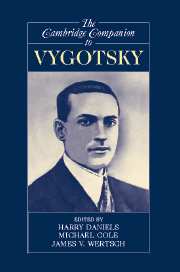Editors’ Introduction
Published online by Cambridge University Press: 28 November 2007
Summary
L. S. Vygotsky was an early twentieth-century Russian psychologist whose writing exerts a significant influence on the development of social theory in the early years of the twenty-first century. The greater part of his legacy was produced in the 10 years that preceded his death in 1934. It now influences a wide range of disciplines and professions. His nondeterministic, nonreductionist account of the formation of mind provides current theoretical developments with a broadly drawn, yet very powerful sketch of the ways in which humans shape and are shaped by social, cultural, and historical conditions.
As David Bakhurst notes in Chapter 2, Vygotsky insisted that in order to understand the mature human mind, we must comprehend the processes from which it emerges. These ideas were originally forged at a time of rapid and intense social upheaval following the Russian Revolution. They were developed by a scholar who was charged with developing a state system for the education of “pedagogically neglected” children (Yaroshevsky, 1989, p. 96). This group included the homeless, of which there were a very large number. Thus, he was working at a time of profound social change (which was influenced by the Soviet adaptation of Marxist theory to social and political practice) and also working with a group of people who had profoundly different cultural experiences from “mainstream” members of society. He sought ways of intervening in the lives of these young people that would either compensate for or ameliorate their experience of marginalization. Consequently, it is, in some way, unsurprising that he should have attempted to develop a theory of social, cultural, and historical formation of the human mind.
- Type
- Chapter
- Information
- The Cambridge Companion to Vygotsky , pp. 1 - 18Publisher: Cambridge University PressPrint publication year: 2007
- 6
- Cited by

